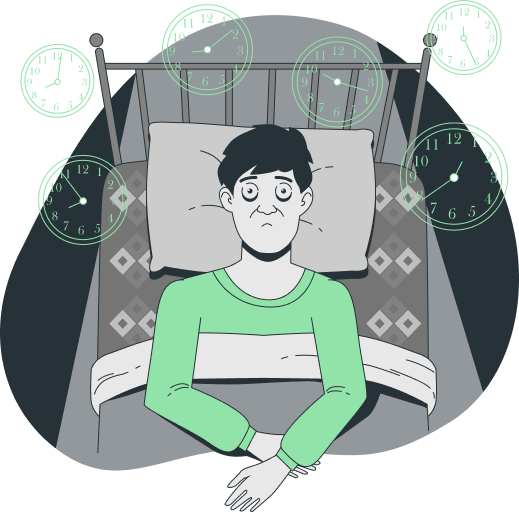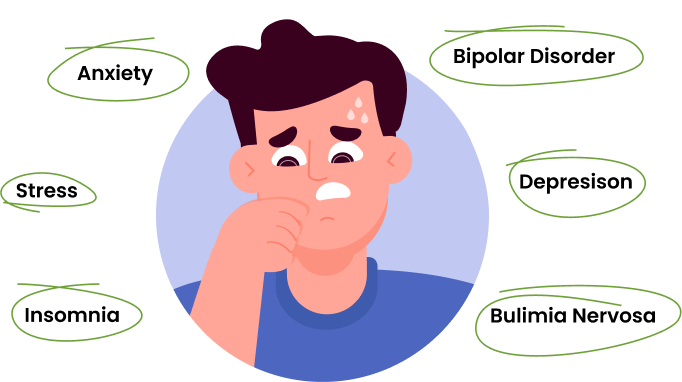
Sleeping for eight hours straight is seen as healthy.
The inability to go asleep or wake up from sleep for no obvious reason is known as insomnia. An issue known as insomnia arises when a person is physically tired, has no physical illness, but nonetheless finds it difficult to fall asleep on their own.
In today’s world, insomnia has become a major psychological problem. A recent poll indicates that one in five people have trouble falling asleep
These considerations have led to an increase in the usage of tranquillizers and sleeping pills.
Newborns require 16 to 17 hours of sleep per day since it is crucial for the development of their brains.
Children between the ages of ten and twelve require nine to ten hours of sleep per night. This keeps his mind sharp and engaged in his schoolwork and other pursuits.
An adult needs six to seven hours of sleep per night. Getting at least six hours of sleep without interruptions allows one to wake up the following day with maximum vitality and energy.
Elderly people over 60 must have seven hours of sleep per night in addition to one to two hours in the afternoon.
After sleeping for about two to three hours, a person wakes up. After being awakened, these individuals cannot go back to sleep.
These individuals have no trouble falling
asleep, but their sleep disappears two to three
hours after they do.
Sleep returns when he tosses and turns on the
bed for an hour or two. People who experience
this pattern all night long wake up worn out,
miserable, and lethargic
These folks have trouble falling asleep.
These individuals sit or toss and turn in bed
for the whole night.
The person is not conscious that they have slept
for even an hour or two. Such an individual is
prone to depression or other mental illnesses.

Having trouble falling asleep, having trouble staying asleep, often awakening during the night Not feeling rejuvenated following a night’s slumber having too many thoughts, being exhausted all day, and being agitated Experiencing horrible or terrible dreams Having trouble focusing or remembering things fretting all the time about whether you’ll get any sleep at all at night.
Causes Of Insomnia
The most common and significant cause of insomnia is stress/anxiety. In today’s fast-paced world, stress levels are rising constantly, especially for college students who are male and female. According to a study, 70% of people who have sleeplessness are under stress or strain.
Sleeplessness is a prominent indicator of mental illnesses like depression, schizophrenia, addiction, etc. These kinds of mental diseases are linked to more serious and persistent sleep issues
Sleep is severely hampered by alcohol consumption, cigarette smoking, marijuana use, and other intoxicants.
Numerous pharmaceutical medications may disrupt your sleep.
Menopause and pregnancy are the two main causes of sleeplessness in women.
Sleeplessness is associated with obesity, persistent headaches, back discomfort, heart disease, asthma, hyperactive thyroid, and Parkinson’s disease.
Most people with insomnia need to take medicine for a while. Without medication, insomnia, particularly that linked to mental illness, does not get better. However, patients are reluctant to take sleeping drugs because of ignorance and false beliefs about them. One such myth is that prescription drugs might become addictive. This belief is false. Short-term use of sleep aids does not lead to the formation of habits.
The only persons who are more prone to develop a drug dependency on sleeping medications are those who take them for six months or longer. Since most cases of insomnia cannot be resolved without treatment, tranquilizers are among the most extensively accessible OTC drugs worldwide. However, there is a higher risk of overdosing when sleeping medications are taken without a prescription and without medical supervision.
These are the most widely prescribed medications for
sleeplessness worldwide, and many pharmacies sell
them over the counter.LORAZEPAM, CLONAZEPAM,
ALPRAZOLAM, and other medications are among them.
These medications are helpful for people who have
difficulty falling asleep. It is not recommended to
use these medications without a doctor’s advice
Following fresh study, these medications have just entered the market.One advantage of these medications is that they lessen the hangover impact. Thus, patients have no trouble rising in the morning.
3.These medications include ESZOPICLONE, ZOPICLONE, and ZOLPIDEM. Additional medications include antidepressants (TRAZODONE, DOXEPINE), anti-melatonin receptor medications (RAMELTEON), etc.
Our psychologist primarily uses cognitive behaviour therapy to help patients sleep better.
This method’s primary goal is to establish
harmony between sleep and bedtime.
The bed should only be used for sleeping, just
as we only use the dining table for eating and
the couch for watching TV, getting breakfast,
and using cell phones.
Making the brain realize that lying in bed is
directly associated to sleep is the major goal
of this technique. Thus, sleep quality has
improved.
Take a shower in either cold or hot water before
bed.
Avoid consuming high-fat snacks and
stimulant-containing beverages two hours before
to going to bed. Keep the bedroom’s lighting
dim. Refrain from operating the equipment
loudly.
After sleeping for 15 to 20 minutes, if you
still can’t fall asleep, get out of bed and go
back to bed when your eyes start to get heavy
again.
Before going to bed, try yoga or other
relaxation techniques to clear your mind and
stop thinking. (Discover relaxation techniques)
Taking a drink of honey, nutmeg, curdled milk,
or fennel syrup prior to bedtime aids in
promoting sleep.
Prior to bed, listening to calming, melodic
music also promotes better sleep.
Taking the first step towards mental health wellness is crucial. Contact us today to schedule an appointment and start your journey to better mental health. We are here to help you every step of the way.
Contact UsHere's what our satisfied patients have to say about Samvedana Minds LLP and our experts. We are dedicated to seeing our patients smile. For privacy reasons, names have been changed.

"Dr. Pradip in Rajkot is an excellent psychiatrist. His compassionate and professional care, along with a well-maintained clinic, make for a highly positive experience. Highly recommended!"

[Name has been changed]

"My wife was suffering from depression for few months back . Someone recommended dr pradip. Sir has good counseling skill and gave minimum medicine. Now she is better and out of depression."

[Name has been changed]

"Dr. Dalsaniya Saheb tackled my erectile dysfunction and low sexual desire with a holistic approach, focusing on therapy rather than just medication. His blend of therapy and couple counseling was incredibly effective. I strongly suggest his services!"

[Name has been changed]

"Good hospital with great staff and outstanding care and also He is good at counseling, gives only necessary medicine, and listens well. Highly recommended and Yes Definitely worth considering!"

[Name has been changed]

"Dr. Pradip sir is really nice and caring. He listens well and genuinely cares about his patients. I definitely recommend him!"

[Name has been changed]

"I had headaches for a year and saw many doctors, but Dr. Pradip in Rajkot helped me feel better in just one month."

[Name has been changed]
If any negative mood state, anxiety, insomnia, appetite change, emotional disturbance, substance dependence, or any other symptom affecting thought, mood, or sleep persists for more than two weeks, you should consult a psychiatrist. Conversely, any symptoms causing acute distress should not be ignored and should be discussed with your doctor.
It's a myth that psychiatrists prescribe medicines to make patients sleep throughout the day and that these medicines will cause dependence that patients can never overcome. Barring a few exceptions, most psychiatric medications are non-sedative. Irregular treatments, self-modulation of doses, and irregular lifestyles can hamper your treatment. Psychiatric medications taken under the supervision of a psychiatrist are not addictive.
Treatment duration is influenced by various factors, including your diagnosis, the seriousness of your condition, how long you've experienced symptoms, any other medical conditions you have, and how consistently you adhere to treatment plans. It's important not to stigmatize psychiatric illnesses and to actively seek the help you need.
Seeking help from a psychiatrist for sex-related issues is important because over 75% of such problems stem from psychological stress, performance anxiety, or fear of failure. Only a qualified psychiatrist can provide proper treatment, unlike unqualified practitioners or self-proclaimed experts. It's crucial to opt for scientific solutions rather than falling prey to quacks, fake hakims, or babas.
Dr. Pradip Dalsaniya stands out as one of the youngest consultant psychiatrists in Rajkot, holding an M.D. degree in psychiatry. With over a decade of experience across various regions of Gujarat, he has effectively addressed numerous chronic and challenging psychiatric cases. Dr. Dalsaniya is renowned for his exceptional counseling abilities, humility, enthusiasm, and attentive listening skills.
Social media, online games, gambling, texting – a smartphone has put up on our fingers too many options to explore. Commonly screen time should not be more than 1 hour/Day.
Our use of smartphone is an addictive behaviour & in generations to come this will be for sure a bigger addicted to this than any substance.
There are more than 300 psychiatric diagnosis. As per the severity, available treatment and good rehabilitation of patient they can lead a normal life. Most of the psychiatric illness have no issues in marriage. But if you are suffering from any such illness or your chosen partner is found to be suffering, contact your nearby psychiatrist to understand the viability.